Shine Muscat scandal: Grapes of wrath as dodgy imports leave a sour taste

In a juicy scandal that’s peeling away layers of safety concerns, the Thailand Consumers Council (TCC) is demanding the Food and Drug Administration (FDA) take a bite out of dodgy importers flooding the market with tainted Shine Muscat grapes. Lab tests have unearthed a sour truth: nearly all of the samples are riddled with banned substances.
Last week, 23 out of 24 grape bunches flunked the safety test, sporting a cocktail of chemicals like chlorpyrifos and endrin aldehyde, both strictly off the menu according to food safety regulations. TCC’s formidable leader, Saree Aongsomwang, is not mincing words. Saree calls on the FDA to crush the culprits with legal action and insists that pending imports face rigorous scrutiny, with any dodgy batches binned pronto.
“Grape importers must recall their products for a thorough inspection, and the FDA should ban companies knowingly importing contaminated grapes.”
The TCC’s detective work saw them snag grapes from all corners: online shops, bustling fruit stalls, fresh markets, and sleek modern trade outlets across Bangkok and beyond, between October 2 and 3. The results? A terrifying tally of 14 nasty chemicals cropping up above the safe limit of 0.01 mg/kilogramme, alongside 50 other residues, of which 22 don’t even have a rulebook under Thai law yet
FDA boss Surachoke Tangwiwat yesterday, October 27, played the stats game, pointing out that while 36 chemicals slipped under the safety radar, there’s still a frantic 14 floating around without even a basic risk assessment. His guidance was simple yet clear: give those fruits a good scrub before you tuck in. Tangwiwat reinforced the FDA’s commitment to zapping these unsafe imports, promising to bring the offending importers to justice.
The grape grapevine has certainly spooked shoppers in Nakhon Ratchasima’s Mueang district, where vendors lament a massive drop in sales, even with juicy discounts of up to 70%. Many are now pulling the problematic produce from their shelves, reported Bangkok Post.
A local trader, 58 year old Thaworn Prommee, revealed that half of his once-popular stock has already gone bad.
“Business operators are experiencing significant losses due to this situation.”
With a scandalous mix of dodgy dealings and toxic trouble, this grape saga is a true cluster of culinary chaos.
Frequently Asked Questions
Here are some common questions asked about this news.
Why are the banned chemicals in Shine Muscat grapes particularly concerning?
They pose significant health risks, violating food safety regulations intended to protect consumers.
How might this contamination issue impact Thailand’s fruit import market?
It could lead to stricter regulations, increased inspections, and a decline in consumer trust.
What steps can consumers take to minimize the risk of ingesting harmful chemicals from imported fruits?
Thoroughly washing fruits can help reduce some chemical residues, although it may not eliminate all contaminants.
What if the FDA fails to take legal action against the importers of contaminated grapes?
Consumer trust in food safety regulations could erode, potentially leading to health crises and economic repercussions for the fruit industry.
How could this incident shape future food safety policies in Thailand?
It may prompt the introduction of more comprehensive regulations and stricter enforcement to safeguard consumer health.
Latest Thailand News
Follow The Thaiger on Google News:


























